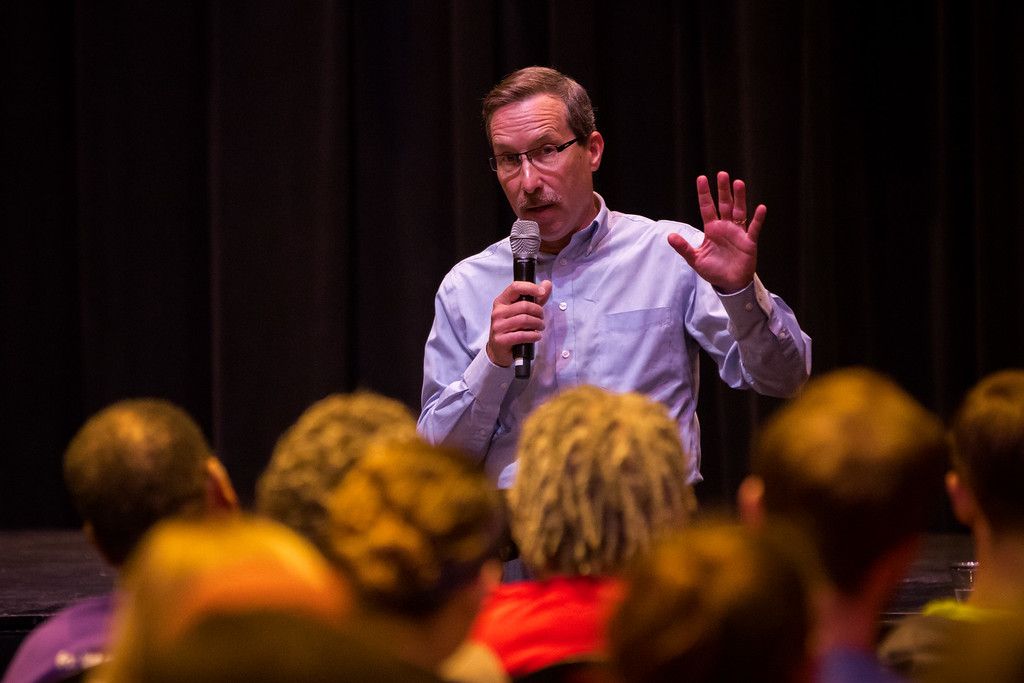by Bruce T. Gourley
Published August 2011
(Baptist Studies Bulletin Archives Index)

What does fear have to do with theology in our 21st century world?
Rob Bell recently reminded Christians of the inadequacy of a faith constructed upon the fear of a Greek mythological-derived and medieval-infused concept of the afterlife. For pointing out the scriptural shortcomings of popular conceptions of hell, Bell was roundly condemned by many Christians (and praised by others, Christian and otherwise).
Yet setting aside debates over the afterlife, what role does fear play in the daily lives of Christians in today’s western world? Does fear sometimes displace truth? Does fear even re-image God?
As late as the 19th century, many if not most Christians in the West remained superstitious of the world in which they lived. Attentive to “signs and wonders,” many were fearful of comets streaking across the sky, physical abnormalities in new-born babies, little-understood illnesses, black cats, and unexplained phenomena. Merging faith and superstition, many Christians subscribed to a theology in which an ever-vengeful God routinely visited his wrath upon humanity in evil manifestations, both in the home and in the heavens.
By the 20th century, many of the “signs and wonders” of old had been explained, thanks to the advances of human knowledge at large and modern science in particular. Belief in omens largely evaporated. The heavens became a wondrous marvel. Deformed babies no longer signified God’s wrath. The secrets of dreaded illnesses gave way to modern medicine, and in the process accompanying misconceptions retreated.
And yet, in the lives of many Christians fear remained the driving force of religious faith. Whereas modern science drove away the oppression of superstition, the rapid growth in human knowledge and understanding challenged and threatened, on an unprecedented scale, Christianity’s centuries-old exclusive claim to truth. With the banishing of one parcel of fears, an even greater fear emerged: the concept of an irrelevant, or even non-existent, God.
Into religious foxholes dove many Christians, afraid that their traditional views of God and the Bible were being wrested from them. Yet “traditional” was quite relative. Fundamentalism arose to defend a brand of Christianity cobbled together from 19th century innovations (biblical inerrancy and pre-millennial dispensationalism) and 17th century constructs (James Ussher’s young earth theory and John Milton’s hell). Devoted to denying scientific claims of truth lest God be mortally wounded, fundamentalism formalized a theology of fear.
Evolution had to be denied, for if true, humans were not God’s special creation. Evidence that the earth and the universe is billions of years old had to be dismissed, for Genesis (at least in English bibles) refers to the “days” of creation, not years. Defending the Bible as literally true and inerrant was paramount, for if the text were to be proven incorrect in the smallest detail, then the existence of God would forever be cast in doubt.
By the mid-twentieth century, a theology of fear dominated much of Christendom in America. Since then, for some there has been no turning back. Entirely dismissing geological and DNA evidence, the president of a prominent Baptist seminary recently insisted that Christians must believe the earth is only thousands of years old and that two individuals named Adam and Eve were the literal mother and father of the human race. Ironically, such theology depends on relatively modern interpretations of the Bible. Only in recent centuries has belief in a young earth emerged as theological necessity, while in the original Hebrew language of Genesis 1-3, Adam and Eve are not literal persons. For proponents of fear-filled faith, accepting scientific truth inevitably leads to the destruction of faith.
Yet a theology of fear in Baptist life emanates far from seminaries. So fearful of a 28-year old young lady called of God to preach (as have been numerous women throughout the history of Baptists), were the male pastors of a local Baptist association in North Carolina, that within days of Bailey Edwards Nelson assuming the pulpit, the association kicked her church out. In a theology of fear, not only is science the enemy, but so are God-called women.
Economically, a theology of fear has led many Christians away from biblical models of stewardship deemed too “liberal,” to embracing an extreme form of modern capitalism that redistributes wealth from the poor to the rich. Distancing themselves from biblical injunctions for nations and people of faith to care for and champion the poor and oppressed, some Baptist leaders today downplay poverty and seek an end to government programs for the poor. At a time in America when so much wealth has been redistributed to the richest of the rich that the 400 wealthiest individuals now own a majority of the wealth of the entire nation’s citizenry and the national wealth-gap is now equivalent to that of third world nations, these Baptist leaders advocate for yet more wealth redistribution to the richest of the rich. In a theology of fear, anything “liberal” – including biblical teachings – is the enemy.
So pervasive has a theology of fear become in America that many U.S. presidential candidates, attempting to woo evangelical Christians, default to a party-line platform of opposition to science and advocacy of more wealth redistribution from the poor to the rich.
In short, today’s theology of fear does a great disservice to God, the Bible, and humanity. Rejecting the revelations of modern science in favor of a Biblical text cleansed of “liberal” teachings reduces Christianity to the realm of mythology and superstition. In trying to defend the God in whom they claim to believe, purveyors of a theology of fear trample upon truth and re-cast God in their own image. And it comes as no surprise that the choreographed, human-imaged God thus projected carries little weight in a 21st century world searching for authentic truth.
